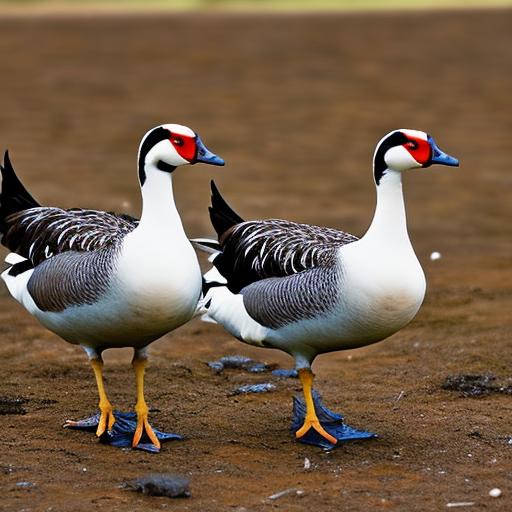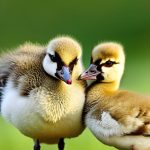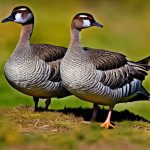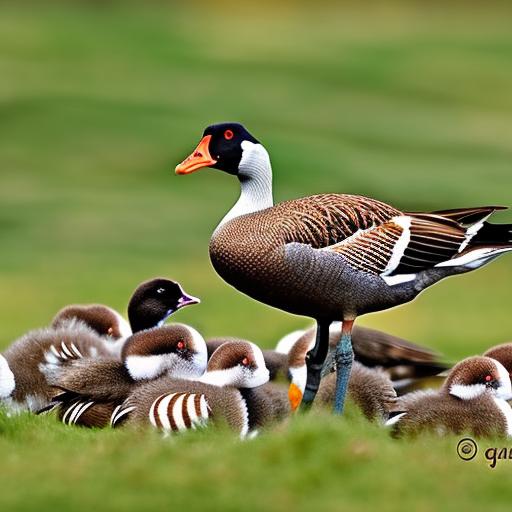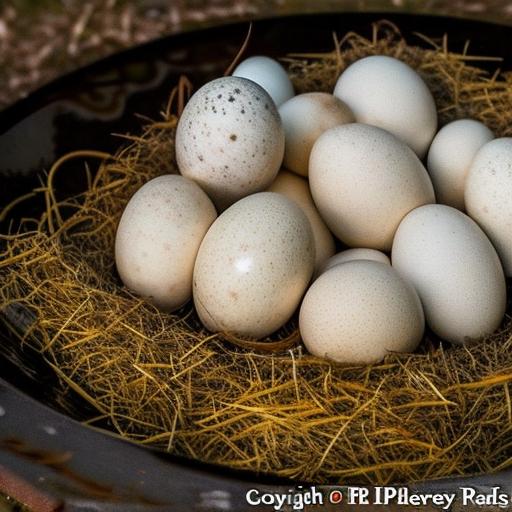African geese breeding has a long and rich history, dating back centuries. These geese are native to Africa and were originally bred for their meat and feathers. Over time, they have become popular as ornamental birds and are now bred for their beauty and unique characteristics.
Breeding African geese can be a rewarding experience for many reasons. Firstly, they are known for their striking appearance, with their large size, long necks, and distinctive knob on their beak. They come in a variety of colors, including white, gray, and brown, making them a visually appealing addition to any flock.
In addition to their physical beauty, African geese are also known for their friendly and docile temperament. They are generally calm and easy to handle, making them suitable for both experienced breeders and beginners. Their gentle nature also makes them great companions for children or other animals on the farm.
Furthermore, African geese are prolific egg layers, making them a valuable addition to any breeding program. A healthy female can lay up to 50 eggs per year, which can be incubated to produce more goslings. This makes them a sustainable source of income for breeders who wish to sell goslings or eggs.
Key Takeaways
- African geese are a popular breed for their meat, eggs, and ornamental value.
- African geese are known for their large size, distinctive knob on their head, and loud honking.
- When selecting African geese for breeding, look for healthy birds with good conformation and temperament.
- The ideal breeding environment for African geese includes a clean and spacious coop, access to water, and protection from predators.
- African geese mate for life and exhibit monogamous behavior, but may require assistance during mating.
Characteristics of African Geese
African geese are known for their unique physical appearance. They are large birds, with males weighing between 18-22 pounds and females weighing between 14-18 pounds. They have long necks and bodies, with a distinctive knob on their beak. Their feathers come in a variety of colors, including white, gray, and brown.
In terms of temperament, African geese are known for being friendly and docile. They are generally calm and easy to handle, making them suitable for both experienced breeders and beginners. They can be easily trained and are often used as therapy animals or for educational purposes.
When it comes to egg-laying capacity, African geese are highly productive. A healthy female can lay up to 50 eggs per year, which can be incubated to produce more goslings. The eggs are large and have a thick shell, making them durable and easy to handle. The incubation period for African geese eggs is around 28-34 days.
Selecting Healthy African Geese for Breeding
When selecting African geese for breeding, it is important to choose healthy birds that are free from any diseases or genetic defects. Here are some signs of a healthy goose to look out for:
– Bright and alert: Healthy geese should be alert and active, with bright eyes and clean feathers. They should not show any signs of lethargy or weakness.
– Good body condition: A healthy goose should have a well-rounded body with good muscle tone. They should not be too thin or too fat.
– Clean vent area: The vent area should be clean and free from any discharge or swelling. This is an important indicator of overall health.
– Clear breathing: Geese should breathe easily and without any wheezing or coughing sounds. Respiratory issues can be a sign of underlying health problems.
When choosing a breeding pair, it is important to select birds that complement each other in terms of size, color, and temperament. This will help ensure that the offspring inherit the desired traits and characteristics. It is also important to avoid breeding closely related birds, as this can increase the risk of genetic defects.
Creating the Ideal Breeding Environment
Creating the ideal breeding environment for African geese is crucial for their health and well-being. Here are some key factors to consider:
– Housing requirements: African geese require a spacious and secure housing area to roam and graze. They should have access to fresh air and natural sunlight, but also have shelter from extreme weather conditions.
– Nesting boxes: Provide nesting boxes or areas where the geese can lay their eggs. These should be clean, dry, and comfortable, with plenty of straw or bedding material.
– Water and food requirements: African geese need access to clean and fresh water at all times. They should also be provided with a balanced diet that includes a mix of grains, greens, and protein sources. Supplement their diet with calcium-rich foods to support egg production.
Understanding African Geese Mating Behaviors
African geese have specific mating behaviors that breeders should be aware of. Here are some key points to consider:
– Mating season: African geese typically mate in the spring, although they can also mate at other times of the year. During the mating season, males will become more vocal and display courtship behaviors to attract females.
– Courtship behaviors: Male geese will often puff up their feathers, extend their necks, and make honking sounds to attract females. They may also perform a “neck bow” display, where they lower their head and neck towards the ground while honking.
– Copulation: Once a male has successfully attracted a female, copulation will occur. This involves the male mounting the female from behind and mating with her. The female will then lay eggs within a few weeks of copulation.
The Importance of Proper Nutrition for Breeding Geese

Proper nutrition is crucial for breeding geese to ensure optimal health and reproductive success. Here are some key points to consider:
– Nutritional requirements for breeding geese: Breeding geese require a diet that is high in protein, vitamins, and minerals to support egg production and overall health. Provide them with a balanced feed that is specifically formulated for waterfowl.
– Feeding schedule: Feed breeding geese twice a day, in the morning and evening. Offer them a mix of grains, greens, and protein sources, such as insects or mealworms. Supplement their diet with calcium-rich foods, such as crushed oyster shells or eggshells, to support egg production.
– Water: Ensure that breeding geese have access to clean and fresh water at all times. They will need to drink plenty of water to stay hydrated and support egg production.
Incubation and Hatching of African Geese Eggs
Incubating and hatching African geese eggs is an exciting part of the breeding process. Here are some key points to consider:
– Incubation period: African geese eggs have an incubation period of around 28-34 days. The exact duration may vary depending on factors such as temperature and humidity.
– Temperature and humidity requirements: The ideal temperature for incubating African geese eggs is around 99-100 degrees Fahrenheit. The humidity level should be maintained at around 50-55%. Use a reliable incubator to ensure consistent temperature and humidity levels.
– Candling eggs: Candling is a process where a bright light is used to examine the development of the embryo inside the egg. This can help determine if the egg is fertile and progressing well. Candling should be done around day 7 and day 14 of incubation.
Raising and Caring for African Geese Goslings
Once the goslings hatch, they will require special care and attention. Here are some key points to consider:
– Brooding requirements: Provide a warm and secure brooding area for the goslings. Use a heat lamp or brooder to maintain a temperature of around 90-95 degrees Fahrenheit for the first week, gradually reducing it by 5 degrees each week.
– Feeding and watering: Feed goslings a high-quality starter feed that is specifically formulated for waterfowl. Offer them fresh water at all times, ensuring that it is shallow enough for them to drink without drowning.
– Socialization: Allow goslings to socialize with other geese and animals from a young age. This will help them develop social skills and become well-adjusted adults.
Common Health Issues in African Geese Breeding
Like any other livestock, African geese are susceptible to certain health issues. Here are some common health issues to watch out for:
– Respiratory infections: Geese can develop respiratory infections, especially if they are kept in damp or poorly ventilated environments. Watch out for symptoms such as coughing, sneezing, and difficulty breathing.
– Parasites: Geese can be affected by external parasites such as mites and lice, as well as internal parasites such as worms. Regularly inspect your geese for signs of infestation and treat them accordingly.
– Egg-binding: Egg-binding is a condition where a female goose is unable to lay her eggs. This can be a life-threatening condition and requires immediate veterinary attention. Watch out for signs such as straining, lethargy, and a distended abdomen.
Tips for Successful African Geese Breeding and Rearing
To ensure successful breeding and rearing of African geese, here are some tips to keep in mind:
– Patience and dedication: Breeding geese requires patience and dedication. It takes time for the geese to mature and start breeding, so be prepared for a long-term commitment.
– Regular health checks: Schedule regular health checks with a veterinarian to ensure that your geese are in good health. This will help prevent and detect any potential health issues early on.
– Proper record-keeping: Keep detailed records of your breeding program, including breeding pairs, hatch rates, and any health issues or treatments. This will help you track the progress of your flock and make informed decisions for future breeding seasons.
Breeding African geese can be a rewarding experience with the right knowledge and preparation. These beautiful birds are known for their striking appearance, friendly temperament, and prolific egg-laying capacity. By selecting healthy geese, creating the ideal breeding environment, understanding mating behaviors, providing proper nutrition, and taking care of goslings, breeders can ensure the success of their African geese breeding program. With patience, dedication, and proper care, African geese can thrive and bring joy to breeders for many years to come.
If you’re interested in African geese breeding, you might also want to check out this informative article on poultrywizard.com about turning a shed into a chicken coop. It provides valuable insights and practical tips on how to repurpose a shed to create a suitable environment for your geese. From designing the layout to ensuring proper ventilation and security, this article covers all the essential aspects of transforming a shed into a functional and comfortable space for your African geese. Read more here.
FAQs
What are African geese?
African geese are a domesticated breed of geese that originated in Africa. They are known for their large size, distinctive knob on their beak, and their ability to lay a large number of eggs.
What is African geese breeding?
African geese breeding is the process of selectively breeding African geese to produce offspring with desirable traits such as size, egg-laying ability, and temperament.
What is the breeding season for African geese?
The breeding season for African geese typically begins in late winter or early spring, when the days start to get longer and the weather begins to warm up.
How do you select breeding stock for African geese breeding?
When selecting breeding stock for African geese breeding, it is important to choose birds that are healthy, have good conformation, and exhibit desirable traits such as size, egg-laying ability, and temperament.
What is the incubation period for African geese eggs?
The incubation period for African geese eggs is approximately 28-34 days, depending on the temperature and humidity levels in the incubator.
What is the best way to care for African geese during the breeding season?
During the breeding season, it is important to provide African geese with a clean and comfortable nesting area, plenty of fresh water and food, and protection from predators. It is also important to monitor their health and behavior closely to ensure that they are thriving.
Meet Walter, the feathered-friend fanatic of Florida! Nestled in the sunshine state, Walter struts through life with his feathered companions, clucking his way to happiness. With a coop that’s fancier than a five-star hotel, he’s the Don Juan of the chicken world. When he’s not teaching his hens to do the cha-cha, you’ll find him in a heated debate with his prized rooster, Sir Clucks-a-Lot. Walter’s poultry passion is no yolk; he’s the sunny-side-up guy you never knew you needed in your flock of friends!

